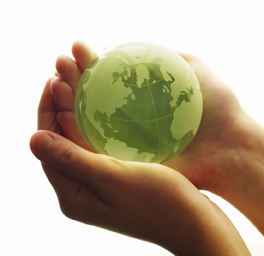Added Incentive to Live a Little Greener
 With all the news stories published on a near daily basis pertaining to the benefits of “going green”, you may be thinking about the changes you can make to your home to reduce energy costs, create healthier surroundings for your family or to be a little kinder to the environment. Especially in today’s economy, the good news is that local, state and federal governments, and even some builders, are offering tax credits and rebates to help offset the costs associated with green upgrades. Following are highlights of just a few of the incentives available for using environmentally-conscious materials and systems, as well as performing other improvements.
With all the news stories published on a near daily basis pertaining to the benefits of “going green”, you may be thinking about the changes you can make to your home to reduce energy costs, create healthier surroundings for your family or to be a little kinder to the environment. Especially in today’s economy, the good news is that local, state and federal governments, and even some builders, are offering tax credits and rebates to help offset the costs associated with green upgrades. Following are highlights of just a few of the incentives available for using environmentally-conscious materials and systems, as well as performing other improvements.
Federal:
- The federal tax credit for residential energy properties applies to solar electric systems, solar water heating systems, fuel cells, small wind energy systems and geothermal heat pumps. A taxpayer may claim a credit of 30% of qualified expenditures for a system that serves a dwelling unit located in the U.S. used as a residence by the taxpayer (does not need to be the primary residence). If the federal tax credit exceeds tax liability, the excess amount may be carried forward to the succeeding taxable year. The 2009 stimulus package removed the caps and specific dollar amounts that were previously imposed on these credits.
- A 2008 energy improvement act applies to energy-efficiency improvements in the building envelope of existing homes and for the purchase of high-efficiency heating, cooling and water-heating equipment for a primary residence in 2009. The 2009 stimulus package extended these credits through 2010 and raised the maximum credit from $500 to $1500 per homeowner.
- For more information, visit www.energystar.gov.
MarylandCounty residents can receive credits for the clean energy they purchase through a Clean Energy Rewards energy supplier or Renewable Energy Certificates (RECs), or that they produce onsite using solar systems. To be eligible for the credit, at least 50% of one’s annual electricity use must come from clean energy sources.
- Additionally, Montgomery County residents can receive property tax exemptions of 50% of the total system cost up to $5,000 for heating, cooling and electricity generating systems and $1,500 for hot water supply systems. While the amount of the tax credit may not exceed the taxes imposed on the property during a fiscal year, excess credits accrued may be carried forward for up to two additional years.
- Statewide, solar heating and cooling systems are granted a special property value assessment that negates their increased value against conventional systems. Solar photovoltaic (PV) and solar hot water systems in contrast receive a full exemption from real property taxes under a separate provision in the tax code.
- The Maryland Solar Energy Grant Program and the Maryland Geothermal Energy Grant Program give grant money to individuals to cover a portion of the costs of acquiring and installing photovoltaic and solar water heating equipment. The grant amounts are:
- Solar Water Heating 30% of system cost up to $3,000.
- Residential Geothermal $1,000 per ton, up to $3,000.
- Photovoltaic Solar $2,500 per kW installed, up to $10,000.
- For more information, visit energy.maryland.gov.
Washington, D.C.:
- According to the District’s Department of Environment, their solar-electric purchase program will offer a rebate based on the size of the system installed. It will run through fiscal year 2012. Rebate amounts come out to be about one-third of the cost of a typical solar electric system. The system owner has six months from the date of approval to complete the installation of their solar electric system.
- For more information, visit www.green.dc.gov/.
Virginia:
- Virginia allows any county, city or town to exempt or partially exempt solar energy equipment or recycling equipment from local property taxes. Residential, commercial or industrial property is eligible. Among the local cities and counties participating in this program are: Alexandria, Fairfax, Falls Church and Loudoun.
- Virginia also allows a four-day sales tax exemption on certain classes of Energy Star and WaterSense products of $2,500 or less per product, purchased for non-commercial home or personal use. This 100% exemption from the state sales and use tax applies to sales occurring during the special four-day period each October. For certain energy efficient products purchased other times of the year, individuals may claim a deduction of 20% of sales tax, up to $500.
- For more information, visit www.deq.state.va.us/p2/vise/.
Finally, we’re pleased to announce the launch of our new BOWA Environmental Incentive Program (EIP), which rewards clients who opt for BOWA-recommended environmental upgrades that go above and beyond our already-high standard specifications. With this first-of-its-kind program, BOWA will rebate our fees on up to $100,000 in approved environmental upgrades for any project in construction in 2009. The BOWA EIP, combined with having the area’s foremost green-building experts on our team and a long history of building to green-construction standards, solidifies BOWA as a leader in environmentally conscious remodeling. This innovative new program is our way of encouraging clients to embrace a lower-impact home, and reinforces our strong commitment to our clients, their families and our community. For more information on the BOWA Environmental Incentive Program, contact us today!
OTHER POSTS
